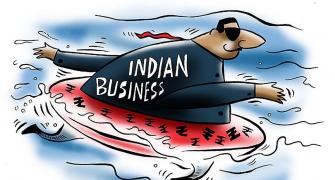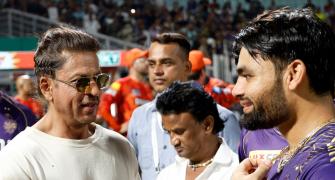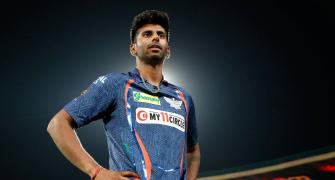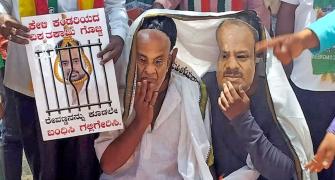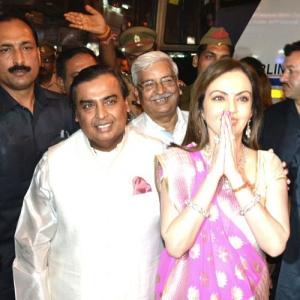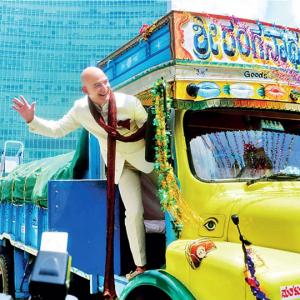Surinder Kapur’s relentless pursuit of quality made Kapur a highly efficient manufacturer of automobile components, notes Bhupesh Bhandari.

Surinder Kapur died on June 30 in Munich after being ill for about a fortnight.
He had sizeable business interests in Germany and had set up home in Munich. In the last few years, he would spend more and more of his time there.
He was humble and cheerful at all times. I always found it difficult to imagine him angry and dispirited. And he loved his family.
Towards the end of March, he had sent me a link to the first YouTube video of his granddaughter, with a request to "like" it. Kapur's large and serene farmhouse was a reflection of his urbane persona.
 Kapur was a product of the Japanese wave of the 1980s. The then government, under Rajiv Gandhi, had taken the first tentative steps towards liberalisation by allowing in Japanese automobile makers.
Kapur was a product of the Japanese wave of the 1980s. The then government, under Rajiv Gandhi, had taken the first tentative steps towards liberalisation by allowing in Japanese automobile makers.
These companies decided to source components locally in order to keep their price tags low.
Sensing an opportunity, Kapur met the bosses of Maruti Udyog, in which Suzuki of Japan had taken a stake, V Krishnamurthy and R C Bhargava, who told him he could choose whatever he wanted to make so long as he would let Suzuki buy 26 per cent in his venture.
Kapur chose to make steering systems and gave just 10 per cent equity in his company, Sona Steering, to Suzuki. (It was renamed Sona Koyo after Koyo of Japan acquired a stake in the mid-1990s.)

The entry of the Japanese automobile companies revolutionised manufacturing in the country. Earlier, Indian quality was poor, deliveries were shoddy and costs were high.
This was unacceptable to the Japanese. To give credit to Indian businessmen, instead of complaining about it, they took it as a challenge and, in a few short years, they were churning out stuff that was almost as good as what was made anywhere else.
Several of them, in due course of time, became global players. Kapur was one of them - at the time of his death, he had manufacturing operations in India, Germany and the United States. Fuji Autotec, in which he had taken a strategic stake, has subsidiaries in Brazil, France, Sweden and the Czech Republic.
Kapur was the biggest proponent of Japanese manufacturing practices in India. He worked with quality gurus like Yoshikazu Tsuda and consultants like Shoji Shiba.
His relentless pursuit of quality made Kapur a highly efficient manufacturer of automobile components. He pursued global quality certifications with missionary zeal.
 He wrote a series of articles on the subject, under the head The Quality Conundrum, for Business Standard some years ago.
He wrote a series of articles on the subject, under the head The Quality Conundrum, for Business Standard some years ago.
In the Confederation of Indian Industry, he was the strongest champion of total quality management, or TQM. Whenever a new concept was discussed, he would offer his company as the guinea pig.
His team had no choice but to go through the drill. Kapur's vision was to "create a company that India is proud of".
He took to the Japanese way like fish to water. Apart from manufacturing best practices like Kaizen and JIT, he did not ignore the softer aspects of the Japanese work culture.
It was not uncommon to find him outside office in company uniform. The only Japanese habit he didn't pick up was golf, though he learnt the next best thing: singing in Karaoke bars.
In later years, Kapur became an ardent fan of German engineering excellence as well. Sona had the heart of a true multinational corporation.
 Kapur would have probably sat in his father's jewellery store in Connaught Place, Kapur di Hatti, had it not been for the fact that his father sired six sons.
Kapur would have probably sat in his father's jewellery store in Connaught Place, Kapur di Hatti, had it not been for the fact that his father sired six sons.
One day, the father took all his sons out for lunch where he told each one of them what he wanted him to do.
Kapur was given the responsibility of becoming an engineer. This took Kapur to the United States, where he did his PhD from University of Michigan. Douglas Aircraft sponsored his doctoral study in aerospace and fluid dynamics.
On his return to India, Kapur had resigned to the idea of working for state-owned Hindustan Aeronautics till fate intervened: he married the daughter of Raunaq Singh of Apollo Tyres.
Singh, who was famous as much for his political connections as his business acumen, was in the process of setting up a new company called Bharat Gears and wanted Kapur to run it - from Bombay.
 That is where Kapur learnt his first lessons in management, especially in industrial relations. Dana Corporation of the United States was ready to place a large order with the company but was worried about the labour strife in the country.
That is where Kapur learnt his first lessons in management, especially in industrial relations. Dana Corporation of the United States was ready to place a large order with the company but was worried about the labour strife in the country.
Datta Samant's name invoked fear outside India too. Kapur managed to strike a deal with Samant, and this encouraged Dana to ink the order.
And then Sona happened. The big moment for Kapur came in 1994 when he formed a venture with the Mahindra group, called Sona Mahindra, that acquired a components arm of Mahindra & Mahindra.
While working for Bharat Gears, Kapur would meet Keshub Mahindra. He held him in great esteem.
At that time, Kapur couldn't have imagined that they would become business partners one day. For several years, he would call this collaboration his biggest success in life.
Kapur will be missed - for his simple ways and good cheer.



